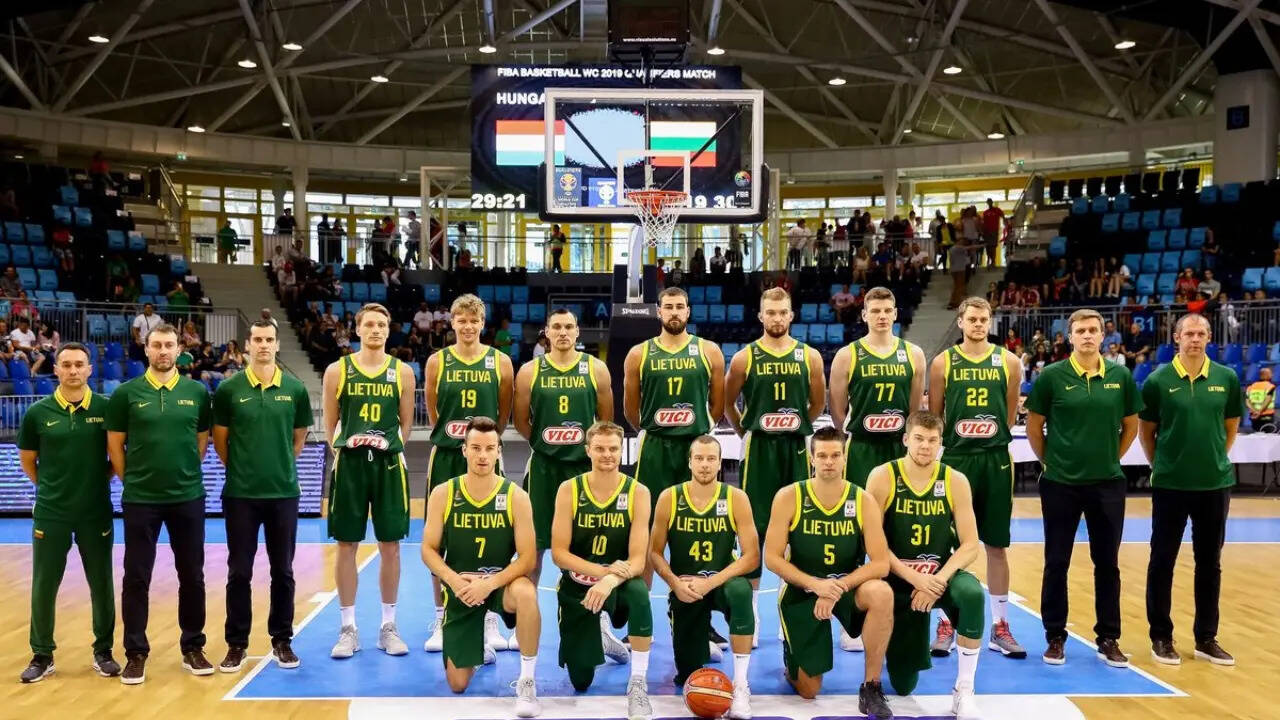
Lithuania’s Basketball team during third window tournament in 2018 (Credit: X)
No sports franchise would have benefited more from the demise of the Soviet Union as the NBA or the National Basketball Association. For, a wave of East Bloc sportsmen, beginning with Romanian gymnast Nadia Comaneci (she defected just before Mikhail Gorbachev decided to end the Soviet Union’s supervisory role over its Warsaw Pact allies) began arriving in the West and almost overnight, helped by the American sporting machine’s hyper-publicity, became instant stars.
A large number were Lithuanian basketballers, established figures in the Soviet arena, Olympic glory behind them, but amateurs, pursued by the almighty dollar. After gold (top honours in the 1988 Olympics), there was the Golden State Warriors — San Francisco’s professional basketball team– for Sarunas Marciulionis. He would play 363 NBA matches for nearly a decade, beginning in 1989, the first Soviet player to do so. And he was only one of the first to cross over.
Look at Jonas Valanciunas, who began with the Toronto Raptors as the Centre (often the tallest player) in 2012, and is now with the Denver Nuggets, after stints with the Memphis Grizzlies, the New Orleans Pelicans, the Washington Wizards and the Sacramento Kings. In this ultra-competitive tournament, he’s played over 900 times. Michael Jordan, arguably the greatest basketball player of all time played 1,072 NBA games! And there’s Darius Songaila, a power forward, actually played for Jordan’s Chicago Bulls in 2005-06.
Who would have thought when he was born in 1978 in Lithuania, then part of the Soviet Union, with General Secretary Leonid Brezhnev a year away from invading Afghanistan, that he would play for Lithuania and nearly 500 times in the NBA?
And there are those who actually played for the Soviet Union before the NBA talent spotters made them offers they couldn’t refuse. Marciulionis and Arvydas Sabonis (he’s 7’3″) had glorious and eerily similar careers: both were born in Kaunus, the second-largest city of 3 lakh people (a large neighbourhood in Mumbai or Kolkata), both were part of the Soviet Olympic gold medal winning team of 1988 and the Olympic bronze medal Lithuanian teams of 1992 and 1996. the Portland Trail Blazers took Sabonis over in 1995 — He played 470 for them. All this from a country of 3 million people, the population of say, Nagpur!
How did Lithuania, a central European Nagpur, become a basketball superpower? As with cricket in India, where every second person has a view, it isn’t very different in Vilnius. Ask Ausra Jarmantaviciute, a teacher, and her answer is “Basketball is in our DNA.” Children, especially boys, grow up watching basketball. And “there are a lot of tall men in the country.” Tomas Vitkus, an IT entrepreneur, speaks of Lithuanians returning from the USA, where basketball was already popular, after independence in 1918, winning the European championships in the 1930s and “even during Soviet times (between 1939 and 1991) basketball was a symbol of our fight for independence.
In 1988, when the Soviet Union won the gold medal in the Seoul Olympics, there were 3-4 Lithuanians in the team. After 1990, (when Lithuania became an independent country again) fighting hard against the Russian team was normal, winning was extremely enjoyable. When we won the Olympic bronze in 1992, everyone celebrated.”
Among national-level basketballers as well, there’s that feeling about the sport being part of the struggle for independence, a symbol of nationalism. “Basketball became a religion in Lithuania when we won the second European basketball championship. Latvia won the first one in 1935. We were kind of mad that the Latvians won, we are brothers and we like to compete. So, we won the next one and the next one. When you win two European championships, it means you are good at it. Victories always inspire the next generation.
They see that you can become a hero, you can become popular and the whole country worships you. Then, the Second World War started, but we somehow kept that passion,” said Tomas Zdanavicius, who played for Lithuania as a junior. “When Lithuania was part of the Soviet Union, “it was a way to talk about ourselves, that we should be independent, that we are good at basketball, that we are fighters. After we gained independence, we continued to spread the word about Lithuania with our victories in the Olympics. It’s a big thing. It’s a big thing.”